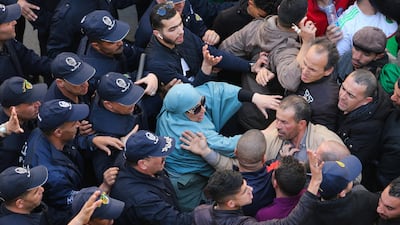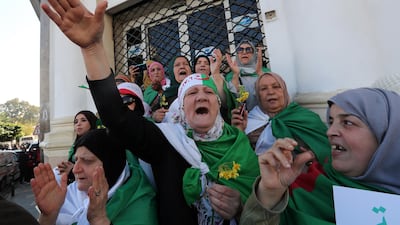A year after Algeria’s protest movement forced the resignation of long-time president Abdelaziz Bouteflika, the global coronavirus pandemic is severely testing the new government, which is already handling a still strong protest movement and a dire economic crisis.
Mr Bouteflika, a veteran of the country’s war of independence, is Algeria’s longest-serving president, holding office for 20 years.
He stepped down in April 2019 following a groundswell of popular unrest, known as the Hirak, which rejected his bid to stand for a fifth term, six years after a stroke left him in a wheelchair and rarely seen in public.
The new administration vowed a clean start, undertaking a corruption purge.
Abdelaghani Hamel, a former national security director-general, was sentenced to 15 years in prison on Thursday for illicit gains and misappropriation of land. His four children received sentences ranging from seven to ten years, while his wife Lanani Salima was sentenced to two years in prison.
However, protesters continued to take to the streets, calling for a full overhaul of the political system.
On March 17, Algeria's new president, Abdelmadjid Tebounne, announced a ban on all marches as part of efforts to combat the spread of Covid-19.
Despite the risks of the global pandemic spreading in the North African nation, some critics initially said government measures were an attempt to put an end to the protest movement in a stark illustration of the lack of trust in the new government.
“Covid-19 is being used to stifle the Hirak,” said Dalia Ghanem, an Algerian political analyst and resident scholar at Carnegie Middle East.
“The country is going through an economic crisis that is really hurting and biting Algerians, and now it is awaiting a health catastrophe, which coronavirus will likely cause in Algeria.
“Any mess up from the authorities in handling the crisis will cost the regime its legitimacy,” she said.
Algeria currently has over 800 confirmed coronavirus cases and 58 deaths, a figure that is likely to rise in the coming weeks and months.
Mr Tebounne was voted into office in December last year in elections boycotted by many who saw it as illegitimate and held to protect the interests of a powerful and entrenched political establishment.
He previously served briefly as prime minister under his predecessor, who is now thought to be holed up in a medically adapted home.
Mr Bouteflika's last public appearance was on April 2 last year, when he was seen on television handing his resignation to Constitutional Council's President Tayeb Belaiz.
Even with the old president gone, protesters vowed to see an end to “le pouvoir” (the power), as the ruling elite of businessmen, advisors and security officials that surrounded Mr Bouteflika were commonly called.
“'Le pouvoir' is a system of governance made of clientelism, embezzlement and cronyism, as well as crackdowns on freedom," said Michael Ayari from Crisis Group.
Mr Ayari said that although protesters initially saw coronavirus measures as political, the perception gradually changed after several Algerian healthcare workers alerted the public about the dangers of the pandemic.
The government has also closed borders, suspended air travel, quarantined Algerians returning home from overseas, closed every public place, including schools and mosques, and disinfected public transport to try to tackle the virus.
However, the burden of these restrictions could have lasting damage to the oil-rich nation’s already struggling economy, which has been hit by, among other things, another dramatic drop in hydrocarbon prices this year.
“The international health emergency narrative concerning this epidemic justifies all these restrictions. Several middle-class Algerians even called for a total lockdown, with potentially disastrous economic and social consequences,” Mr Ayari said.
But, he said, it's unlikely to kill off the movement for change.
“The protest movement could be made more determined in the future due to the economic and social consequences of the restrictions, as well as the repression.”
Ms Ghanem also believed that there are "dark days" ahead for Algeria.
"The economic situation is terrible, and the regime has to use what’s left of its exchange reserve [to support the economy] that have already depleted. This is going to have a terrible impact socially, economically and politically and will affect the stability of the country," she said.














